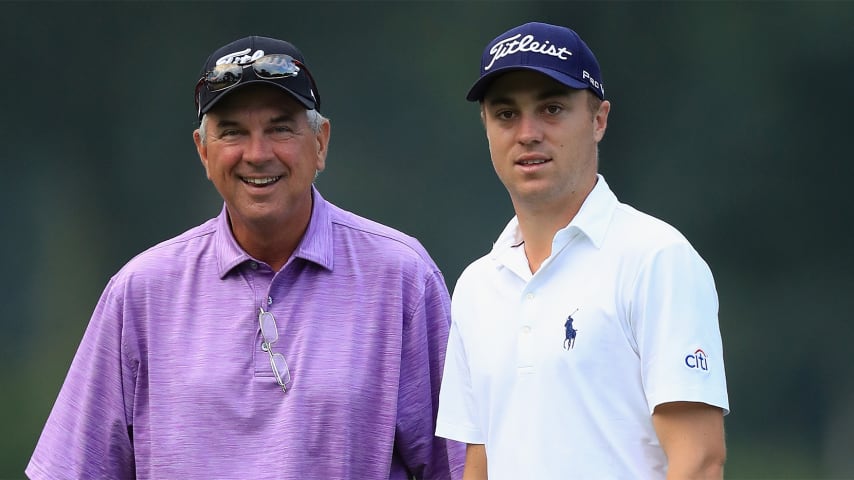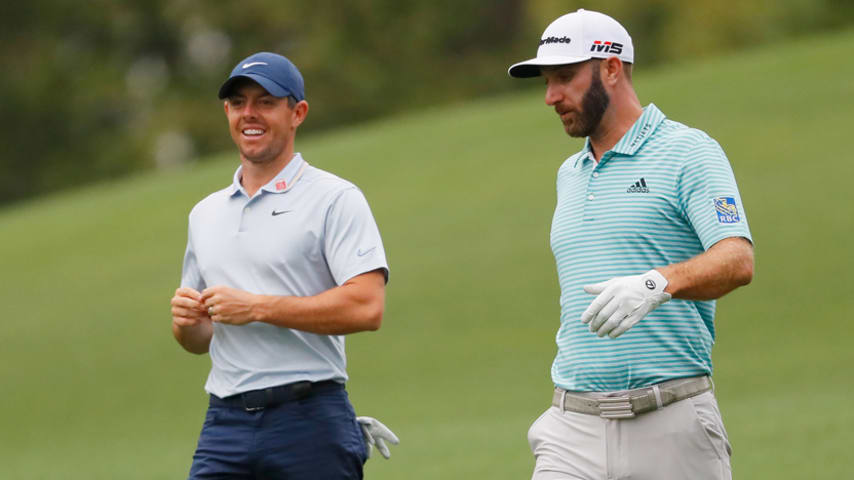Tom Watson: How Byron Nelson enriched my life
9 Min Read

Written by Tom Watson

Essential Byron Nelson
Maybe it was the pro-am at Doral in 1974. Or perhaps a practice round. It’s been 46 years ago, so I don’t recall the exact day. But what I do remember clearly is that a man started coming my way, which I thought was odd since nobody else was following us. After all, I was just three years into my PGA TOUR career and had not yet won a tournament.
As he moved closer, I said, “That looks like Byron … no, wait, yes, that is Byron Nelson.” I knew what he looked like because I had watched him on the golf broadcasts on ABC.
He walked right out on the fairway and said, “Tom, I’d like to introduce myself. I’m Byron Nelson.”
And that’s how it started. Right there. A great, great friendship that certainly impacted not only my career but my life. A friendship that went beyond golf, a friendship truly worth cherishing.
THE IMPACT OF BYRON NELSON
Even before meeting him, I had considered him one of the greats, mainly because of my father’s love of golf history. He always talked about the Great Triumvirate – Nelson, Snead and Hogan. My dad’s favorite was Snead and his golf swing. But he always told me, “You know, that Nelson, he had a dip in his swing but man, could he really play.”
The next time I saw Byron, though, was under less-than-ideal circumstances. It was a few months later after the final round of the ’74 U.S. Open at Winged Foot. The day before, I shot 69 to take the lead and had a chance to win my first major. But that Sunday, I shot 79 in the final round to give it away. Afterwards, I was up on the second floor of the clubhouse, having a beer with my friend John Mahaffey. In walks Byron – Lord Byron -- and the place goes silent. He stood at the swinging doors there and asked me a question. “Tom, could I speak with you for just 5 minutes?”
I went out to meet him for that private conversation. He started out, “I really enjoy watching you play. You conduct yourself well. You played great yesterday. And today, your swing was just a little bit off. I think you got a little fast, which is typical to do when you have a chance to win the U.S. Open. I know of what I speak.”
He was consoling me, trying to make me feel better. I was so appreciative of that. Exactly the words I needed to hear at that moment from one of the game’s legendary players.
He then wrapped up the conversation by inviting me to his Fairways Ranch in Roanoke, Texas. “I’d love to help you out with your golf swing, if you’d like to,” he said. I thanked him for the offer, but I was still working with my coach back in Kansas City, Stan Thirsk. It took me a couple of years but eventually I took Byron up on that offer.
Two weeks after the U.S. Open disappointment,I won for the first time on the PGA TOUR, the Western Open at Butler National. And then the next year, I won for the second time – the Byron Nelson Classic. Byron was there to greet me afterwards. Unlike at Winged Foot, we had something to celebrate.
Two months after winning in Dallas, I saw Byron again. It was just before the final round of the ’75 Open at Carnoustie. Earlier that day, I had warmed up at Monifieth, which is about 5 miles away. It was something I always did when I played at Carnoustie. Just hit my own balls there before driving over to the course.
I was worried about the traffic, so I left early and arrived at Carnoustie with plenty of time to spare before I teed off; I was three shots off the lead and had a late tee time. As I made my way to the putting green, I walked past the press tent. There was Byron standing there with Chris Schenkel, his ABC broadcast partner. I went over to say hello. I then asked Byron, “What do you think it’s going to take today for me to win?”
He told me, “Tom, the weather has turned bad. The wind’s blowing. If you shoot around even par, you’ll be right there.” I’m paraphrasing here, but I do know he told me around even par. And that’s what I ended up shooting, a 72 that put me in a playoff with Jack Newton. The next day, it was Newton who shot 72 in our 18-hole playoff. Fortunately, I shot 71 to win the first of my five British Opens.
The next season was not as productive, though. I wasn’t playing well; I didn’t win any tournaments in ‘76. That fall, I called Byron. “Do you mind if I come down?” And so I went to Roanoke, and that’s when our relationship really took off, as I got to know Byron and his first wife Louise.
I really just enjoyed his company. I always revered the way he treated people, the way he was with people, the way he could give off-the-cuff speeches when he's entertaining people at golf events, or other functions. He was very natural and funny. And at that time, I was not very good at that, and that taught me quite a bit. Just the way he conducted himself.
He loved the simple life, and I saw value in that. He started to love woodworking, and he had created a woodworking shop at his ranch. He wasn't too adept with the table saw, though. He cut part of his thumb off, and another finger off -- a couple of different accidents. But he loved to work with wood, and he created trivets, and a hope chest for my daughter.He had a tool that allowed him to sign his name on the back of everything there -- Byron Nelson. Just very special to me and my family.
After that, I saw him all the time, especially when Louise had her stroke. I visited Byron often, staying at his ranch. The one memory that sticks in my mind is how committed and loyal Byron was to Louise. I don't remember how many years Louise lived after she had that stroke, but she was in a very compromised state. Couldn't move, couldn't really speak, but she was aware of things going on around her. Byron stayed by her side, constantly, constantly. That loyalty showed what type of man he was to the love of his life.
Louise finally passed, and when she did, there was somewhat of a weight that was lifted, but there was also a big hole there to fill. It wasn't too long after that, Byron called me for some advice. It had to do with this woman up in Dayton, Ohio. He told me the story about meeting Peggy and the conversations that went after that. Then he asked me, “Tom, do you think it’s too soon to start having feelings for somebody?”
I said, "Byron, you have to follow your heart. You're a Christian man. You know what's right for you. You'll find out what's right for you.”
That summer, I was on the first tee waiting to play a practice round at the PGA Championship at Inverness. Here comes Byron walking up to the tee. I see this Cheshire cat grin on his face, and I knew something was up. Byron came over to the tee and he said "Tom, I have something special I want to tell you.” Before he could get it out of his mouth, I said "You're getting married!”
That started a wonderful, wonderful life with Peggy. I never saw them going anywhere without holding hands. He always thanked her for everything she did, and it was wonderful to see such a great relationship. I'd never seen somebody that had such a love and a humble love for another person as Byron Nelson did for Peggy. That's what you learned from being around Byron Nelson. The golf was incidental, it was the character of the man, that's what I will forever be grateful for.
He was a lovely man, with a great heart. One of the things that happened after he married Peggy and they were still living on the ranch, they discovered gas there. It was pretty cool. They drilled some wells -- I think there were two or three wells that were completed and were successful. He donated some of the proceeds from these gas wells to Abilene Christian University. That’s typical Byron.
He was a gentle man, a simple man, but a man of grace, and loyalty. A man who had a great sense of humor, was a ham at heart. He loved to show off in front of people with his golf swing.
I always reflect back on the junior clinic I was doing at Preston Trail for the kids during his tournament. Byron was there watching, and I did my exhibition. I said, "All right, Nelson, come over here. I want you to show these kids how to really swing a golf club." So I gave him my driver. He had his teaching golf shoes on, hadn’t warmed up. I said, "All right, off the deck with the driver. I want you to hit a straight ball, I want you hit a draw, and I want you to hit a fade." He did exactly what I asked him to; it was beautiful. Right off the deck. No tee. Right off the ground with the driver.
I looked at the kids and said, "I don't think many of you really recognize what you just saw."
I don’t remember the last time I saw Byron. But I do remember calling Peggy when he passed away. I said what normal people say: "I'm so sorry. I am so sorry” and she said, "Don't be sorry. He's right where he wants to be. He's out of the time and the space of the material world, and he's in his own spiritual world."
How would I sum up my relationship with Byron? For more than 30 years, he enriched my life. Enriched it in so many different ways. His relating of his stories of how he grew up. Stories from when he played the TOUR, the players on the TOUR, the things that he did off the TOUR, the relationships he built with people in the Salesmanship Club and the tournament.
People revered Byron for the man he was. They understood what a fine, honest man he was -- a genuine man who treated life as a blessing. When you were around Byron, you learned that from him. That's the beauty of Byron Nelson.
World Golf Hall of Fame member Tom Watson won 39 times on the PGA TOUR, including eight major championships. He made 28 consecutive appearances at the AT&T Byron Nelson, winning four times, including three consecutive wins from 1978-80. In 2010, Watson was awarded the Byron Nelson Prize by the Salesmanship Club in Dallas, presented to a person or organization in golf exemplifying the ideas of giving back to the community. He has been described as the “greatest champion” in the history of the AT&T Byron Nelson.





